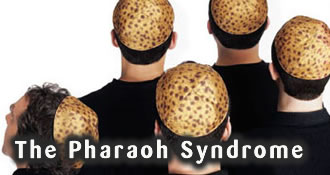
People knock educational psychologists and their euphemisms, but I often wonder if we wouldn't be better off borrowing some of their political correctness when dealing with Torah issues. The four sons, for example, might be better understood as the Gifted Child, the Difficult Child, the Well-Balanced Child and the Inquisitively Challenged Child. Those intolerant of "the Desecrators of the Holy Shabbat" might be more inclined towards meaningful dialogue if they modified their terminology to "the Sabbatically Challenged". I'm sure you can think of many other applications yourself... the list goes on and on to "the Chassidically Challenged," "the Authentistically Challenged," etcetera.
There are also some major aspects of the Exodus story that could be better understood if we would just use the right terminology. Take the event of the splitting of the Red Sea, which occurred on the seventh day of Passover. It's easy to be derogatory about Pharaoh when you consider matters superficially. Here he sees a whole nation being led by a pillar of fire over the sea floor on dry land between two pillars of water that stand as stone walls - even Indiana Jones would have thought twice - and like a madman rushes in with his entire army. And it wasn't like he hadn't any precedent to learn from.
One might be tempted to describe Pharaoh in this situation as a little lacking up there, to be polite. But here is a case where one of those PC terminologies comes in useful. You see, Pharaoh was actually quite intellectually capable. It was just that he was Monotheistically Challenged.
To be more specific, Pharaoh belonged to a subset of the monotheistically challenged that have a fixation with a perceived natural order ("Ma'at" in Ancient Egyptian. Similar to the Buddhist concept of Kharma. In modernese, "Physics"). When a conflict arises between natural order and perceived reality (i.e. a miracle), the subject experiences anxiety. Whereas this anxiety could be easily resolved through the assumption of an Omnipotent Force behind and beyond nature, our subject prefers to simply ignore the obvious reality before his eyes in favor for the world-concept of natural order that he has previously integrated into his personality. This could result in extreme drowning under the crashing waves of the Red Sea.
See, now that I've provided a more sympathetic view of Pharaoh's personal difficulties, he becomes so much easier to relate to. After all, we do the same thing all the time. At least, I do. It's called "worry".
Worry is a state where we ignore the obvious, perceived reality in favor of a warped, unsubstantiated view of how we imagine the natural order to be. We imagine our life as a struggle between our own competency and the laws of physics, commerce and social acceptance. Personally, that would mean I have a lot to worry about.
The obvious reality is that our daily life is full of miracles straight from Above. We have very little control over where we end up and what we have to do there. Physics doesn't have much say, either. We can just do our best with whatever we are given and have confidence in the Director Of It All that He knows what He's doing.
But instead, we worry.
Why do we worry? Because we don't perceive the miracles. Why don't we perceive the miracles? Because we see this natural order going on all around us, and if there is a natural order, then miracles could not have happened, right? After all, don't miracles mean that nature's laws are temporarily trashed, that life becomes totally weird, and G-d's voice is heard bellowing, "Tzvi Freeman, take note! This is a miracle!"?
Wrong. That's just Pharaoh all over again. Perhaps somewhat more subtle, but Pharaoh nonetheless.
Monotheism means that the natural order is not an absolute set of rules to either play by or break by. Believing there is One Infinite Force behind all things means acknowledging that He can be found doing His thing anywhere - by the rules or not by the rules. Nothing stops Him from getting His way - no supervising committee, no appeal board, no shareholders, no mother-in-law. Not even the Natural Order.
The prognosis? According to the prophets, we eventually grow out of this. Like we read in the haftorah for the last day of Passover: "As the days when you left Egypt, so I will make you see miracles." (Isaiah 10:32)
Rabbi Menachem Mendel of Lubavitch (the "Tzemach Tzedek," 1745-1826) explained, "As the days when you pointed at the Red Sea splitting and said, 'This is my G-d doing this!' so then, in those times, I will let you see the even more wondrous miracles that are happening in your daily life."

